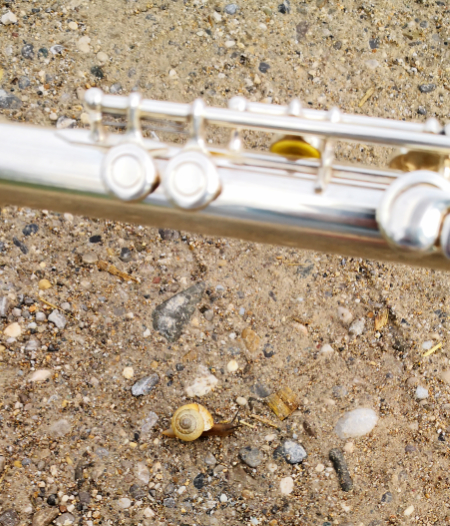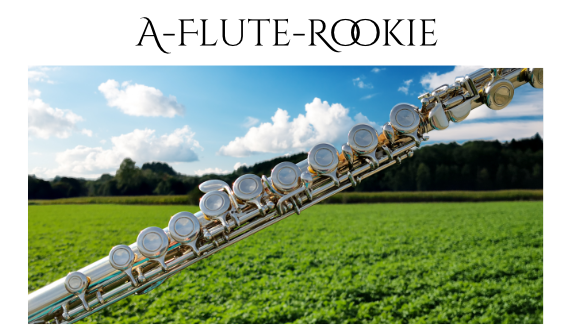September 2020
I started taking piano lessons at the age of 54. It had been a great desire of mine for all my life to learn how to play the piano.
At first I thought it was a great idea to start taking lessons at a Jazz School. Very quickly it turned out, that as a beginner, I was unable to cope with chords, harmonies and improvisation. To support myself, I hired a classical piano teacher to teach me the basics. It's now great fun with both of them and I learn a lot.
That is my musical starting point. In addition, I sing in one, two, three choirs when everything is not shut down because of Corona Pandemie.
I'm actually musically busy with that. Why the flute? Why do I develop an interest in this instrument? Planing to take lessons? And going to blog about my experiences while learning this instrument?
I have always been fond by the sound of a flute.
Our daughter fell in love with this instrument. She heard someone practising the flute through an open window and asked if there was an angel playing by chance because the notes were so heavenly beautiful. She had to wait a while before taking lessons, because she was too small for it. But she did not forget her desire.
In the beginning her flute had a curved headjoint so that she could handle it better as a very small person. I loved it when she practised. When the individual notes turned into melodies and the sound changed. It became purer and fuller the longer she played.
After a few years, she didn't want to continue playing. The teacher noticed that too and advised us not to force her to continue learning. She said that in the end the child always wins. But in this way she can say goodbye to the instrument in an amicable way and keep it in good memory. Maybe later in her life she will unpack the flute again and go on with playing.
So for many years the flute lay in a twilight sleep down in the cellar.
During the Corona summer 2020, I got my hands on it and brought it back to daylight. I'm very fascinated by the filigree mechanics, its elegance, its shine. But alas! It is not so easy to elicit sounds from it. In which direction do you have to hold it? Where should the fingers be placed? I can't see any system in the arrangement of its keys.
I need someone to familiarise me with the instrument. I found a flute teacher. She tells me that I have to adjust myself that it takes quite a while to produce sounds out of the flute. It can be a bit frustrating at first.
She lets me blow into the headjoint. Oh! Sounds come out even without the rest of the flute. She wants me to turn the mouth plate a little bit forward, back again. Does anything change?
I blow into my hand, direct the jet of air down my arm. Up again. This changes the position of the lips and the chin. The gap between my lips should not be larger than the embouchure hole of the lip plate from the flute. The idea of spitting out a cherry stone helps.
Don't twist the lips into a smile, it's better when the corners of the mouth go downwards.
The sound must start clearly. The tip of the tongue should hit the upper front teeth, it should sound like a "döh". It often comes out a bit smoky or airy. Sometimes it develops into an upper octave and then suddenly slips back down. I have no idea why this happens. It just happens.
My teacher let me assemble the instrument. It is important that the headjoint is in the right position in relation to the middle section. There are marks on both that should be aligned. The axis of the footjoint should line up with the large tone holes and the mouth hole.
The left thumb is under the single thumb key, my right pinkie on the D sharp key. Left index finger and right thumb support the flute from below. The remaining fingers are slightly rounded. This way they can touch the middle of the key more quickly.
She teaches me how to play a "G". I play it. She teaches me an "A" and a "B". I play them. I notice that she is surprised that this goes quite quickly with me. With many pupils it takes several weeks until the notes come out like that. I myself am surprised that it is easy for me.
 You can already start something with three tones. After the first lesson I am excited in a postive sense and cannot possibly go home. I drive to the outskirts of my town and march across the fields to a park bench, where Flute and I take a seat.
You can already start something with three tones. After the first lesson I am excited in a postive sense and cannot possibly go home. I drive to the outskirts of my town and march across the fields to a park bench, where Flute and I take a seat.
It's not exactly bright sunshine, so there aren't many walkers. I am a little undecided whether to unpack the flute. To practise my three newly learned notes open-air. What will people say? Will I be laughed at? Will they complain because it's still noisy?
I decide to be brave. Nothing can happen. If someone feels disturbed, I will pause until they have moved on.
The notes don't sound so good without correction from my teacher. Sometimes they sound fine. But I have to take a break from time to time. The breath flows not very constantly and I am gasping for air.
At times my fingers press the wrong keys. I hear when it's not the right one and have to keep glancing at my fingers for orientation.
I am really a newcomer to the flute, a true flute-rookie of the first order. But the flute responded to me and it felt good.
After three quarters of an hour, I can't go on any more. The lips tighten and only a rustle comes out.
That's it for today. No one from the walkers spoke to me or looked at me askance. That's good. I think I will try practising again outside.
I had one patient listener. It was a small snail.
 During the next few days the weather is unsettled. Sometimes I have evening duty. There is not enough time in the afternoon to go practising in a park, in the fields or in the forest. I practise in my flat and am inhibited. I am afraid that my neighbours will feel disturbed by my practising.
During the next few days the weather is unsettled. Sometimes I have evening duty. There is not enough time in the afternoon to go practising in a park, in the fields or in the forest. I practise in my flat and am inhibited. I am afraid that my neighbours will feel disturbed by my practising.
I'm a bit more carefree in nature and take advantage of every halfway good weather situation. And I'm getting more and more used to practising outside. The other day a dragonfly took an interest in me. It circled around me for a long time and shimmered so wonderfully with all its colours in the afternoon sun.
I have arranged with my teacher to take a lesson every 2 or 3 weeks. I allow myself two piano lessons a week and another lesson at a frequent interval would be beyond my financial means.


